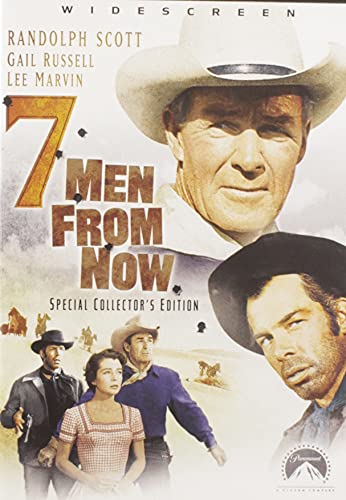Seven Men from Now
***½/**** Image B+ Sound A Extras A-
starring Randolph Scott, Gail Russell, Lee Marvin, Walter Reed
screenplay by Burt Kennedy
directed by Budd Boetticher
by Travis Mackenzie Hoover Like most Budd Boetticher movies, Seven Men from Now is supremely modest. Despite my high star rating, I fear overselling its virtues–it's not a searing, world-shattering masterpiece that leaves you devastated. But for a sort of chamber western, it's lovely and uncommonly sensitive. The film doesn't dig on the adventure and violence that are the major selling points of the genre: it's about an ex-lawman's guilty torment; a failed husband's obliviousness to the trials of his wife; and a kind-of outlaw who's sort of a friend but also sort of not. There is of course a revenge plot and the occasional incursion of marauding Indians, but you barely notice them over the nuances of the characters and their various sadnesses. It's less than genius but somehow more than the action oater you know the studio wanted.
We first see Ben Stride (Boetticher regular Randolph Scott) approaching, then killing, two men who had something to do with the death of his wife. That's all the information we're provided–and it's only when he comes across a pair of beleaguered settlers, John and Annie Greer (Walter Reed and Gail Russell), headed for California on the slimmest of pretexts that Stride's backstory begins to emerge. At the prompting of old nemesis Bill Masters (Lee Marvin), who soon joins the caravan, the truth comes out: Stride failed to provide for his wife after losing his sheriff's position, requiring her to take a job at Wells Fargo and thus facilitating her murder by robbers. Hence, he seeks to recover not just the five remaining men–as well as the $20,000 they and Masters covet–but his self-respect, too.
Burt Kennedy's terrific script dovetails the character threads beautifully. Aside from Stride's mission, there's the sad story of Annie Greer, whose husband can't find work and is eventually revealed to have been offered quick money under shady circumstances. She'd like to stand by John, but she can't help but be drawn to this widower who wants to do right by his wife. Masters, meanwhile, is a fascinating study in contradictions: he's clearly a ne'er-do-well who'd love to lay his lecherous hands on Annie, but he also has a begrudging respect for Stride, the man who locked him up twice. The strands become entangled in the end, yet there's room for complexity in this vision of the western revenge saga.
Boetticher, for his part, makes sure we notice the smell of failure and the pangs of regret. The big climactic shootout doesn't happen with High Noon intensity; Seven Men from Now is rueful as opposed to exciting, with a group of men who'd rather kill or be killed than respect human life. There's nothing "kinetic" about the film–it's more about being knee-deep in the molasses of your shame and doing your best to extricate yourself. Although it's a journey story, one doesn't really get a feeling of motion: it's mostly people hanging around, discussing their problems or speaking to stir up emotions. And it stirs up some emotions of its own: genuine feeling does not elude the Boetticher/Kennedy westerns, especially in this case.
THE DVDParamount's "Special Collector's Edition" DVD release of Seven Men from Now (mistitled 7 Men from Now on the cover art) is more or less first-rate. The 1.80:1, 16×9-enhanced transfer is significantly edge-enhanced–undercutting efforts to restore the image to its celluloid prime–but suprisingly vivid given its Warnercolor origins. The Dolby 2.0 mono audio is fortunately free of any such interference and sounds terrific. Extras include a commentary by Professor of Cinema at San Francisco State Jim Kitses, who proves to be no-nonsense in his assessments: he's not one for background data, choosing instead to comment on the action and the technique as it happens. It's a refreshing change of pace from the sort of extraneous information that renders so many commentaries redundant.
Meanwhile, "Budd Boetticher: American Original" (50 mins.) is a remarkably well-rounded seven-part documentary on the director and the making of this film in particular. Assembling a crack group of directors (Eastwood, Tarantino, Bogdanovich, Towne) and other authorities, the piece mounts a very strong case for the quality of Seven Men from Now–and though there are notable elisions (the studio's butchering of Bullfighter and the Lady goes unmentioned) and irritations (Taylor Hackford's misty-eyed comments), it's a model of the form. "The John Wayne Stock Company: Gail Russell" (12 mins.) is a somewhat maudlin and badly-scored but still affecting treatment of the short life of Russell, who got a contract fresh out of high school and handled the pressure with too much alcohol. "Lone Pine" (6 mins.) is a decent travelogue of the location used to shoot the film as well as the film festival that has grown up around its frequent use in the production of Hollywood westerns. The trailer, a trailer for the Batjac collection, a photo gallery, and propaganda for the John Wayne collection round things out.
78 minutes; NR; 1.80:1 (16×9-enhanced); English DD 2.0 (Mono); CC; English subtitles; DVD-9; Region One; Paramount






